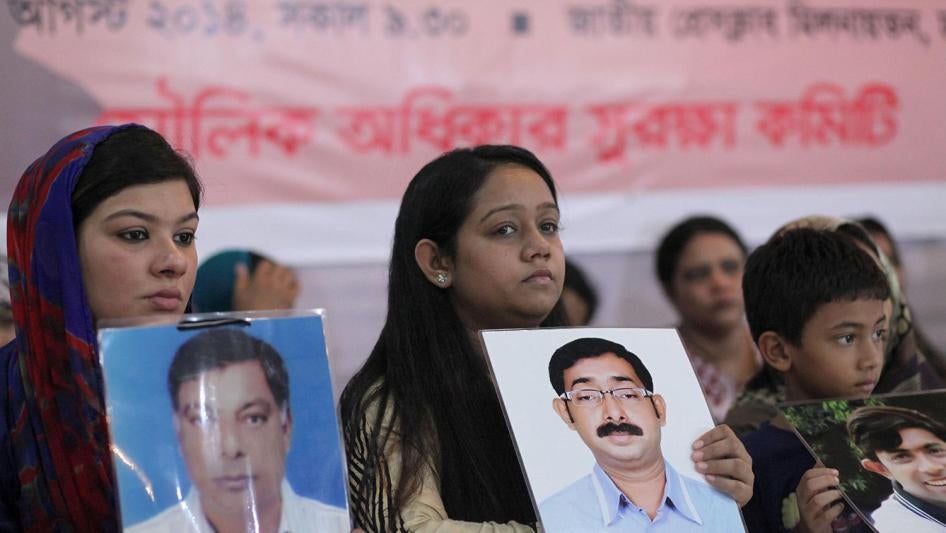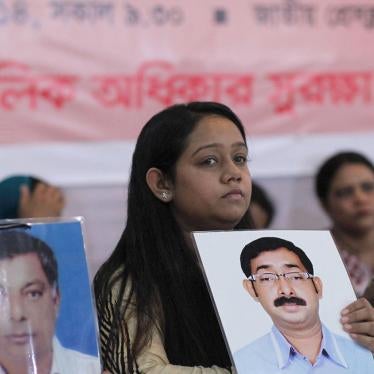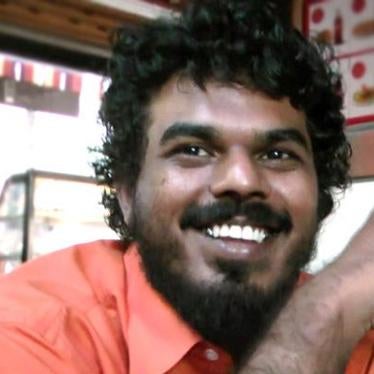It was August 9, 2016 when Bangladeshi security forces took Mir Ahmad Bin Quasem away—in front of his wife, sister and two young daughters. A few weeks before he disappeared, Bin Quasem, or Arman as he is called by his friends and relatives, had told me that he was worried for his safety. The young lawyer was defending his father against allegations of war crimes during the country’s war for independence, so he explained that he had to remain in Dhaka. The father was convicted and hanged a month after Arman was disappeared.
Under international human rights law, an enforced disappearance occurs when a person is taken into custody by government officials or their agents and the state refuses to acknowledge the person’s fate or whereabouts, placing the victim outside the protection of the law.
The legal explanation does not, however, convey the horror families endure as they try and grapple with the enforced disappearance of a loved one.
The holidays are the hardest, Arman’s wife tells me. The children don’t understand why their father is not home for Eid.
In Sri Lanka, a number of families of the tens of thousands of people who disappeared during the three-decade civil war are camped in street corner protests. Photographs of the missing are lined up at the edge of the protest, many of them of children. The war ended in 2009, and these families are still hoping that their loved ones will be found. One woman told me about her missing husband. If it is cold, she hesitates to use a blanket, wondering if he is warm enough. His favourite meal, she said, is no longer prepared in the house.
In Kashmir, they use the horrifying term ‘half widow,’ for women whose husbands are missing.
In South Asia, the recent history of violent conflict, whether the war in Afghanistan; insurgencies in Balochistan, Pakistan or Kashmir, India; civil war in Sri Lanka and Nepal; or political violence in Bangladesh and the Maldives, has resulted in serious human rights violations including secret detention and enforced disappearance. While in some cases people who were illegally detained were eventually released, in many other instances their bodies were eventually retrieved. Too many—tens of thousands—remain missing.
On August 30, families and activists around the world will commemorate the International Day of the Victims of Enforced Disappearances, and call upon governments to resolve these cases, provide answers and accountability. The problem is widespread. Since its inception in 1980, the UN Working Group on Enforced or Involuntary Disappearances has transmitted 56,363 cases across 112 countries—but thousands of the cases are not reported to the UN system.
Unfortunately, governments are often reluctant to respond. Answers will entail admission that security forces arbitrarily detained someone, and possibly executed them. It will lead to addressing the entrenched impunity for these forces, often because their violations may have had government sanction. The Bangladesh authorities, for instance, simply deny the disappearances even after the security forces take someone away in front of witnesses. They claim that the disappeared are hiding to evade debt obligations or are felons dodging arrest.
Even when governments seek to respect rights, accountability can be a challenge. In Sri Lanka, the government elected in 2015 on a mandate of reconciliation promised to address laws of war violations in a consensus resolution at the UN Human Rights Council. With an estimated 65,000 disappeared, the government has established an Office of Missing Persons, but is still dragging its feet on bringing those responsible to justice, which will entail independent investigators, prosecutors, and judges. In Nepal, a Commission of Investigation on Enforced Disappeared Persons established in 2015 has received nearly 3,000 complaints but has yet to complete investigations in even a single case, and is not mandated to order prosecutions.
Disappearances are a particularly egregious form of human rights violation. The victims, removed from legal protections, remain at the mercy of their captors, at severe risk of torture or inhumane treatment, and of extrajudicial killings. Even those that are released suffer physical and psychological trauma, almost always fearing retribution if they do speak out or seek justice.
Families must live with the uncertainty of not knowing if their loved ones are dead or alive, and worrying about their conditions in captivity. I know a mother who has repeatedly fallen prey to a scamster who takes money from her with false promises to ensure that her son would not be tortured, would be given a blanket, and would have access to his medicines — she refuses to believe otherwise. I met another mother who clung to a newspaper photograph of man that she insisted was her son, now an adult, and still alive — it later turned out to be incorrect.
Families are destroyed, not just because they don’t know the fates of those disappeared, but also for more practical, legal reasons. Without conclusive evidence of a person’s passing, families cannot access bank accounts, determine inheritance, or claim pension and insurance benefits.
Governments sometimes issue death certificates after a person is disappeared for a number of years. But that still provides no answers. In 2016, Sri Lanka’s prime minister, Ranil Wickrememsinghe, said that the missing were "probably dead," leading to an outcry of questions about the circumstances. In August, President Yameen Abdul Gayoom of the Maldives had to retract his comments after a flurry of questions when he said that a missing journalist was dead. Even when families accept that a person is dead, there is no closure. In Nepal, I met families who refuse to complete the last rites for their loved ones until they get justice. In Kashmir, hundreds of unidentified foreign fighters are buried in unmarked graves, but the government is yet to order forensic tests to determine whether the remains of "dissappeared" Kashmiris are also hidden away in those graveyards.
On this International Day of the Victims of Enforced Disappearances, all countries, including in South Asia, should take immediate steps to end this heinous practice. Ratifying the International Convention for the Protection of All Persons from Enforced Disappearance is crucial, along with incorporating its provisions into national law. Countries should also order independent and impartial investigations of all reported cases of enforced disappearance and hold those responsible to account.
Until their whereabouts are determined, families of the disappeared should have access to effective remedies and reparations, including regular updates on the status of the investigations. This cruelty needs to stop.










